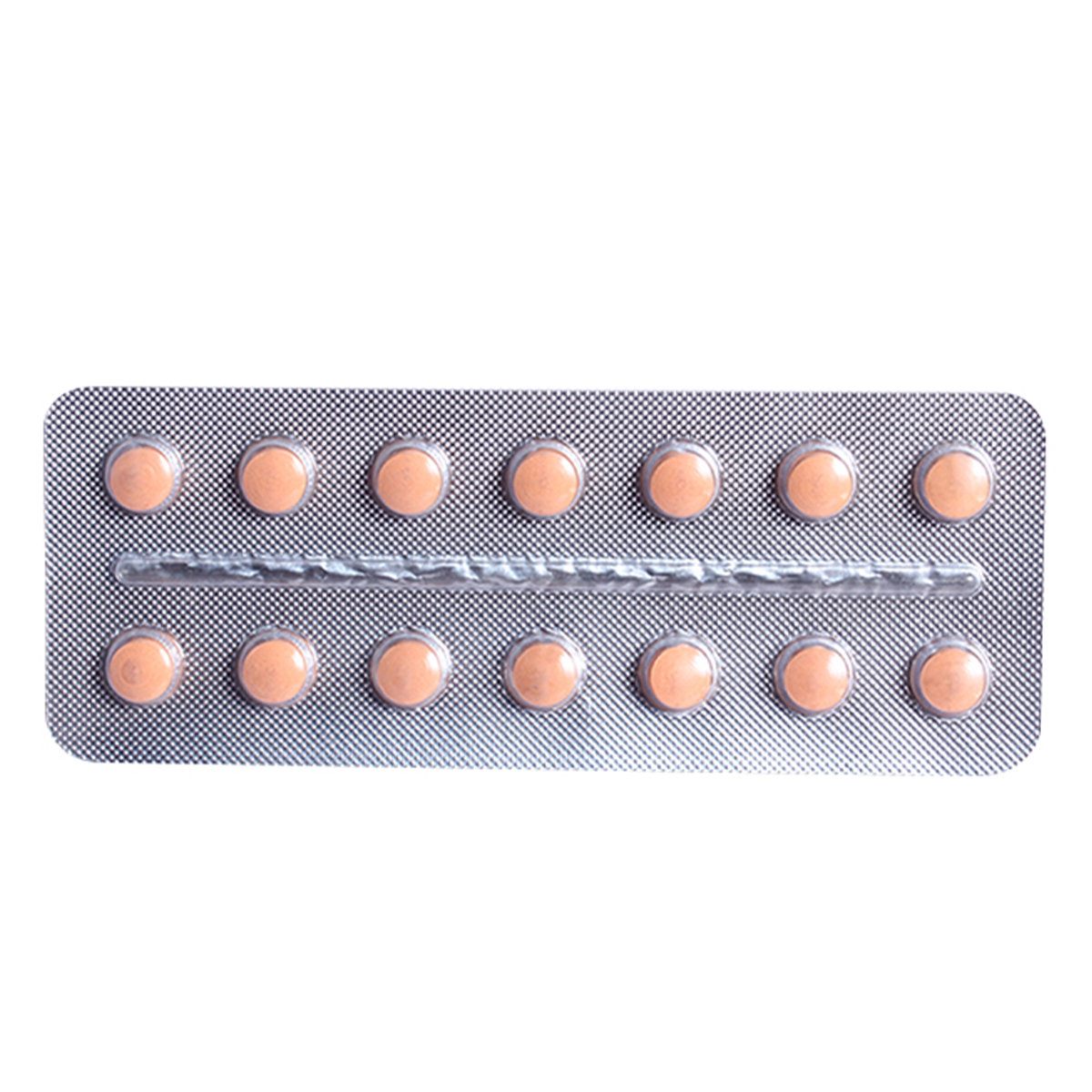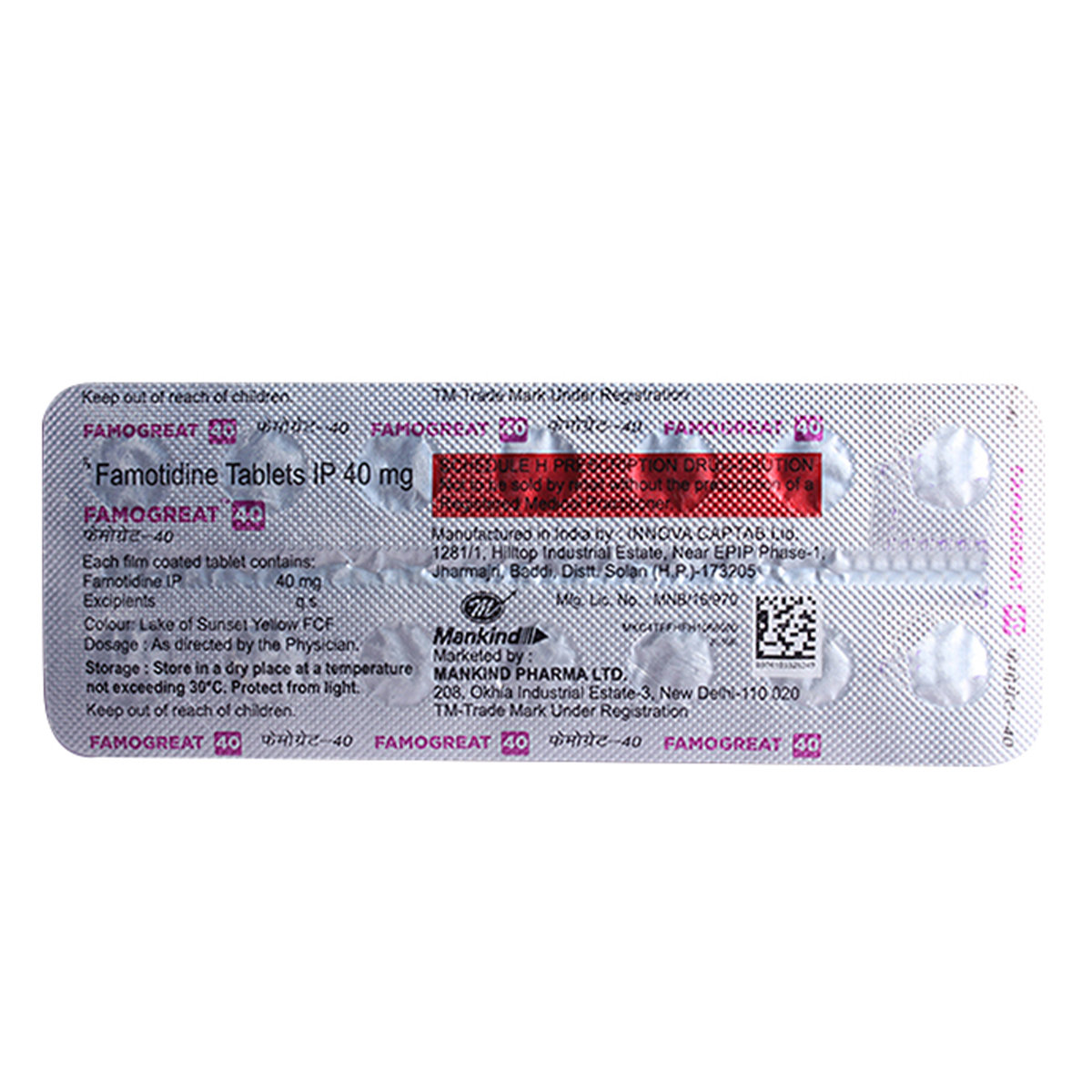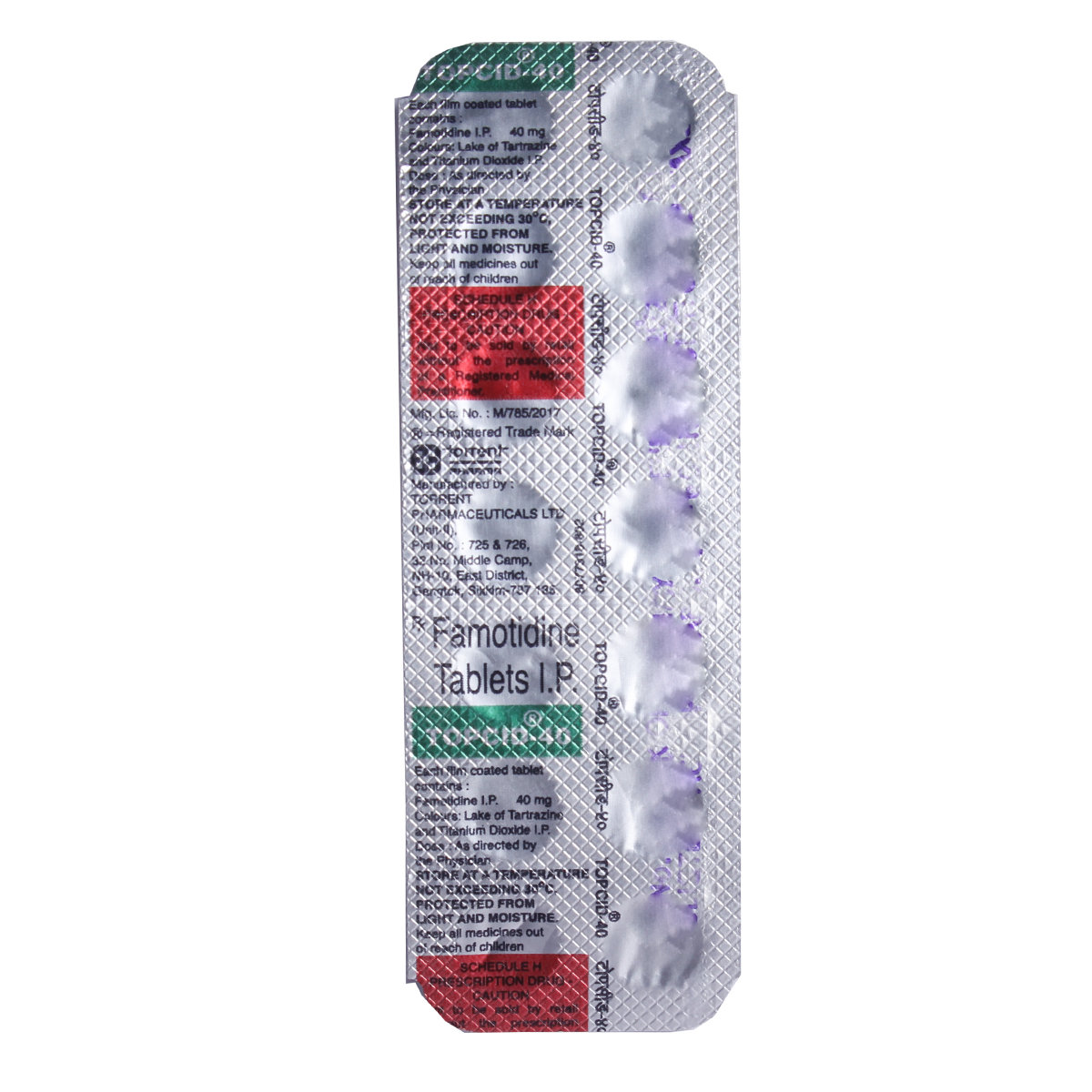Famogreat 40 mg Tablet 14's
MRP ₹27.5
(Inclusive of all Taxes)
₹4.1 Cashback (15%)
Provide Delivery Location
Online payment accepted
 Prescription drug
Prescription drugWhats That
Composition :
Manufacturer/Marketer :
Consume Type :
Expires on or after :
Return Policy :
About FAMOGREAT 40 TABLETS
FAMOGREAT 40 TABLETS belongs to a group of medicines called ‘H2-receptor antagonists that reduce acid production in the stomach. It treats stomach ulcers (gastric and duodenal ulcers), reflux oesophagitis, and Zollinger-Ellison syndrome. Stomach ulcers are painful sores present on the inner lining of the stomach. Reflux esophagitis is the inflammation of the oesophagus (food pipe) that causes the backward flow of stomach contents into the oesophagus. Zollinger-Ellison syndrome is a condition in which the tumours formed in the pancreas (produces enzymes for digestion) and duodenum (part of the small intestine) increase stomach acids.
FAMOGREAT 40 TABLETS contains ‘Famotidine’, which acts as an antacid. It inhibits the H2-receptors present in stomach cells. It reduces the production of acid and the volume of gastric secretions. As excess acid can cause the inflammation of the oesophagus, stomach, and intestine, a reduction in the production leads to improvement in the symptoms and condition.
FAMOGREAT 40 TABLETS must be taken in the dose and duration advised by the doctor. Sometimes, you may experience headaches, dizziness, constipation, and diarrhoea. Most of these side effects of FAMOGREAT 40 TABLETS do not require medical attention and gradually resolve over time. However, if the side effects are persistent, reach out to your doctor.
FAMOGREAT 40 TABLETS is not recommended for use in children and breastfeeding mothers. Do not take FAMOGREAT 40 TABLETS if you are allergic to famotidine, other H2 receptor antagonists, or any other ingredients present in it. Before taking FAMOGREAT 40 TABLETS , inform your doctor if you are taking prescription or non-prescription medications, including antacids, any nutritional supplements, or herbal products. Inform your doctor if you have any gastrointestinal problems, Helicobacter pylori (H. pylori) infection, lactose intolerance, or kidney diseases. Inform your doctor if you are pregnant or planning to become pregnant.
Uses of FAMOGREAT 40 TABLETS
Directions for Use
Key Benefits
FAMOGREAT 40 TABLETS belongs to a class of medications called H2 receptor antagonists. Histamine binds to the H2 receptors present in parietal cells of the stomach and stimulates the production of acid. FAMOGREAT 40 TABLETS bind to these receptors and blocks the histamine action. It also decreases the gastric secretion content. It also reduces the gastric secretion stimulated by food, caffeine, insulin, and pentagastrin. Caffeine, insulin (used in the treatment of diabetes), and pentagastrin (a synthetic drug that aid in diagnosing thyroid malignancy) stimulate gastric acid secretion.
Storage
- Hydrate your body: Drink enough water to prevent dehydration and headaches.
- Calm Your Mind: Deep breathing and meditation can help you relax and relieve stress.
- Rest and Recharge: Sleep for 7-8 hours to reduce headache triggers.
- Take rest: lie down in a quiet, dark environment.
- Cold or warm compresses can help reduce tension.
- Stay Upright: Maintain good posture to keep symptoms from getting worse.
- To treat headaches naturally, try acupuncture or massage therapy.
- Over-the-counter pain relievers include acetaminophen and ibuprofen.
- Prescription Assistance: Speak with your doctor about more substantial drug alternatives.
- Severe Headaches: Seek emergency medical assistance for sudden, severe headaches.
- Frequent Headaches: If you get reoccurring headaches, consult your doctor.
- Headaches with Symptoms: Seek medical attention if your headaches include fever, disorientation, or weakness.
- Inform your doctor about dizziness symptoms. They may adjust your medication regimen or prescribe additional medications to manage symptoms.
- Follow your doctor's instructions for taking medication, and take it at the same time every day to minimize dizziness.
- When standing up, do so slowly and carefully to avoid sudden dizziness.
- Avoid making sudden movements, such as turning or bending quickly, which can exacerbate dizziness.
- Drink plenty of water throughout the day to stay hydrated and help alleviate dizziness symptoms.
- If you're feeling dizzy, sit or lie down and rest until the dizziness passes.
- Track when dizziness occurs and any factors that may trigger it, and share this information with your doctor to help manage symptoms.
- Inform your doctor about your constipation symptoms. They may adjust your medication or advise alternative treatments.
- Stay hydrated by drinking sufficient of water (at least 8-10 glasses a day) to help soften stool and promote bowel movements.
- Increase fibre intake by eating foods high in fibre, such as fruits, whole grains, vegetables and legumes, to help bulk up the stool.
- Establish a bowel routine by trying to go to the bathroom at the same time each day to train your bowels.
- Engaging in regular exercise, like walking or yoga, can support in bowel movement stimulation.
- Consult your doctor if constipation persists, and discuss alternative treatments or adjustments to your medication.
- Inform Your Doctor: Notify your doctor immediately about your diarrhoea symptoms. This allows them to adjust your medication or provide guidance on managing side effects.
- Stay Hydrated: Drink plenty of fluids to replace lost water and electrolytes. Choose water, clear broth, and electrolyte-rich drinks. Avoid carbonated or caffeinated beverages to effectively rehydrate your body.
- Follow a Bland Diet: Eat easy-to-digest foods to help firm up your stool and settle your stomach. Try incorporating bananas, rice, applesauce, toast, plain crackers, and boiled vegetables into your diet.
- Avoid Trigger Foods: Steer clear of foods that can worsen diarrhoea, such as spicy, fatty, or greasy foods, high-fibre foods, and dairy products (especially if you're lactose intolerant).
- Practice Good Hygiene: Maintain good hygiene to prevent the spread of infection. To stay healthy, wash your hands frequently, clean and disinfect surfaces regularly, and avoid exchanging personal belongings with others.
- Take Anti-Diarrheal Medications: If your doctor advises, anti-diarrheal medications such as loperamide might help manage diarrhoea symptoms. Always follow your doctor's directions.
- Keep track of your diarrhoea symptoms. If they don't get better or worse or are accompanied by severe stomach pain, blood, or dehydration signs (like extreme thirst or dark urine), seek medical help.
Drug Warnings
FAMOGREAT 40 TABLETS should not be used in children and breastfeeding mothers. Do not take FAMOGREAT 40 TABLETS if you are allergic to famotidine, other H2 receptor antagonists, or any other ingredients present in it. Before taking FAMOGREAT 40 TABLETS , inform your doctor if you have any gastrointestinal problems, Helicobacter pylori infection, lactose intolerance, or kidney diseases. Inform your doctor if you are pregnant or planning to become pregnant.
Drug-Drug Interactions
Drug-Drug Interactions
Login/Sign Up
Using Famogreat 40 mg Tablet with atazanavir may interfere with atazanavir and decrease its effectiveness.
How to manage the interaction:
Co-administration of Famogreat 40 mg Tablet with Atazanavir can result in an interaction, but it can be taken if a doctor has advised it. Do not discontinue any medications without consulting a doctor.
Taking Famogreat 40 mg Tablet with Risedronic acid can increase the blood levels of Risedronic acid.
How to manage the interaction:
There may be a possibility of interaction between Risedronic acid and Famogreat 40 mg Tablet, but it can be taken if prescribed by a doctor. In case you experience any unusual side effects, consult a doctor. Do not stop using any medications without talking to a doctor.
Famogreat 40 mg Tablet can make Gefitinib less effective by reducing its absorption in the body. This can lead to low treatment outcomes.
How to manage the interaction:
Co-administration of Famogreat 40 mg Tablet with Gefitinib can result in an interaction, but it can be taken if a doctor has advised it. It is advised you to take gefitinib 6 hours before or 6 hours after Famogreat 40 mg Tablet, to reduce the effects of the interaction. Do not stop using any medications without a doctor's advice.
Using Famogreat 40 mg Tablet with indinavir can impair Indinavir absorption, resulting in lower levels in the blood and, potentially, lower effectiveness.
How to manage the interaction:
Co-administration of Famogreat 40 mg Tablet with Indinavir can result in an interaction, but it can be taken if a doctor has advised it. Do not discontinue any medications without consulting a doctor.
Combining Nicotine with Famogreat 40 mg Tablet may reduce the clearance of nicotine.
How to manage the interaction:
Although taking Famogreat 40 mg Tablet and Nicotine together can cause an interaction, it can be taken if your doctor has suggested it. Do not stop using any medications without a doctor's advice.
Co-administration of Digoxin and Famogreat 40 mg Tablet may increase the level or effect of Digoxin.
How to manage the interaction:
Although there is a possible interaction between Digoxin and Famogreat 40 mg Tablet, you can take these medicines together if prescribed by a doctor. Do not discontinue the medication without consulting a doctor.
Famogreat 40 mg Tablet can make Pazopanib less effective by reducing its absorption in the body.
How to manage the interaction:
There may be a possibility of interaction between Famogreat 40 mg Tablet and Pazopanib, but it can be taken if prescribed by a doctor. Do not discontinue any medications without consulting a doctor.
Co-administration of Famogreat 40 mg Tablet with secretin may generate a hyperresponse in gastrin(hormone) secretion in reaction to secretin stimulation tests, erroneously indicating gastrinoma (tumor usually found in the pancreas or duodenum).
How to manage the interaction:
Although taking Famogreat 40 mg Tablet and Secretin together can cause an interaction, it can be taken if a doctor has suggested it. To assist in the identification of gastrinoma(tumor usually found in the pancreas or duodenum), discontinue Famogreat 40 mg Tablet at least 2 days before using secretin. Do not stop using any medications without a doctor's advice.
When Tizanidine with Famogreat 40 mg Tablet, Famogreat 40 mg Tablet can considerably raise the blood levels and effects of Tizanidine. This could result in a sudden decrease in blood pressure.
How to manage the interaction:
Taking Famogreat 40 mg Tablet with Tizanidine together can result in an interaction, but it can be taken if a doctor has advised it. However, if you experience dizziness, fainting, and irregular heart rhythm, consult your doctor immediately. Do not stop using any medications without talking to a doctor.
Coadministration of ketoconazole and Famogreat 40 mg Tablet may reduce the effectiveness of ketoconazole.
How to manage the interaction:
Although taking Ketoconazole and Famogreat 40 mg Tablet together can result in an interaction, it can be taken if a doctor has prescribed it. Without consulting a doctor, never stop taking any drugs.
Drug-Food Interactions
Drug-Food Interactions
Login/Sign Up
Coffee, Energy Drinks With Caffeine
How to manage the interaction:
When Famogreat 40 mg Tablet is taken along caffeine or other acidic drinks the likelihood of stomach discomfort is increased. Avoid or consume caffeine in moderation while taking Famogreat 40 mg Tablet
Diet & Lifestyle Advise
- Maintain a healthy weight. Lose excess weight if you are overweight or obese.
- Do not lie down immediately after eating.
- Eat smaller meals in short intervals.
- Elevate the head of the bed while sleeping.
- Quit smoking.
- Reduce caffeine and alcohol intake.
- Reduce stress.
- Do not take nonsteroidal anti-inflammatory drugs (NSAIDs) without the doctor's advice.
Side Effects of FAMOGREAT 40 TABLETS
- Headache
- Dizziness
- Constipation
- Diarrhoea
Habit Forming
Therapeutic Class
All Substitutes & Brand Comparisons
RX
Out of StockFamodin 40mg Tablet
Cadila Pharmaceuticals Ltd
₹3.75
(₹0.24 per unit)
86% CHEAPERRX
Out of StockFamocer 40mg Tablet
Elder Pharmaceuticals Ltd
₹4.52
(₹0.29 per unit)
83% CHEAPERRX
Out of StockFamot 40mg Tablet
Suzikem Drugs Pvt Ltd
₹3.6
(₹0.32 per unit)
81% CHEAPER
Drug-Diseases Interactions
Drug-Diseases Interactions
Login/Sign Up
FAQs
Drug-Drug Interactions Checker List
- KETOCONAZOLE
- ITRACONAZOLE
- CEFDITOREN
- RILPIVIRINE
Disease/Condition Glossary
Stomach ulcer: Stomach ulcers, also called gastric ulcers, are sores present in the inner lining of the digestive tract (oesophagus, stomach, or small intestine). It occurs when acid (produced during digestion) in the stomach damages the inner lining. Frequent use of pain killers such as aspirin and an underlying H. pylori infection may cause stomach ulcers. Symptoms include nausea, changes in appetite, bloody or dark stools, unexplained weight loss, vomiting, and indigestion.
Reflux esophagitis: Reflux esophagitis is also referred to as gastroesophageal reflux disease (GERD). It occurs when stomach acid frequently flows back to the oesophagus (food pipe). This backflow (acid reflux) irritates the food pipe and causes heartburn. Symptoms include heartburn, sour or bitter taste in the mouth, and difficulty swallowing.
Zollinger-Ellison syndrome: Zollinger-Ellison syndrome is a rare condition in which tumours form in the pancreas (organ present near the abdomen and produces enzymes for digestion) or duodenum (first section of the small intestine) leads to an increase in the production of stomach acid. Symptoms include nausea, vomiting, abdominal pain, diarrhoea, and weight loss.

Have a query?
Alcohol
Safe if prescribed
FAMOGREAT 40 TABLETS may interact with alcohol and increase the risk of side effects.
Pregnancy
Consult your doctor
FAMOGREAT 40 TABLETS is a category B medicine. It should be used only when prescribed by a doctor.
Breast Feeding
Consult your doctor
FAMOGREAT 40 TABLETS is excreted in breast milk. So, it is should not be given to breastfeeding mothers.
Driving
Safe if prescribed
FAMOGREAT 40 TABLETS may cause dizziness and headache. So, you should not drive or operate heavy machinery after taking FAMOGREAT 40 TABLETS .
Liver
Consult your doctor
FAMOGREAT 40 TABLETS should be used with caution in patients with liver diseases.
Kidney
Consult your doctor
FAMOGREAT 40 TABLETS should be used only when prescribed by a doctor. Dose adjustments may be necessary.
Children
Safe if prescribed
FAMOGREAT 40 TABLETS is not recommended for use in children.












